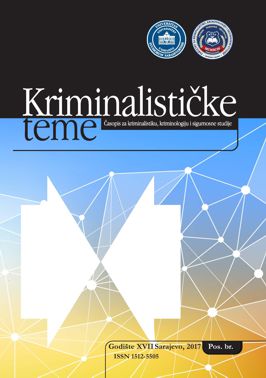SUPRANACIONALNA KRIMINOLOGIJA: HOSTIS HUMANIS GENERIS? – ZLOČINCI ILI OBIČNI LJUDI U VANREDNIM OKOLNOSTIMA
SUPRANATIONAL CRIMINOLOGY: HOSTIS HUMANIS GENERIS? – EVIL DOERS OR ORDINARY PEOPLE IN EXTRAORDINARY CIRCUMSTANCES
Author(s): Mirza BuljubašićSubject(s): Criminal Law, International Law, Criminology, Peace and Conflict Studies
Published by: Fakultet za kriminalistiku, kriminologiju i sigurnosne studije Univerziteta u Sarajevu
Keywords: Supranational criminology; war; international criminal law; perpetrators; war criminals;
Summary/Abstract: Reason for writing and research problem(s): This paper is inspired by the criminological theories of Alette Smeulers, Arne Johan Vetlesen and Hanne Arendt; they problematize the foundations of criminology – why people do evil? To get a relatively adequate answer to this question it is necessary to detect and reveal who perpetrators of the most serious criminal acts are. The perpetrators of war crimes, crimes against humanity, and genocide are often called hostis humanis generis – the enemies of all mankind. These crimes were committed in specific (extraordinary) circumstances and under the wider context of terror and fear, which probably affects the “ordinary” people. Can an extraordinary condition transform the generic essence of a human being into a cold-blooded killer, rapist, etc.? In that manner, is it possible, in a phenomenological sense, to define the perpetrators hostis humanis generis? Aims of the paper (scientific and/ or social): The main goal of this paper is to (re)solvethe central dilemma of supranational criminology - whether war crime perpetrators are ordinary people or hostis humanis generis? Methodology/Design: The research was conducted in the Penal and Correctional Facility Sarajevo. Qualitative data was gathered by (semi-structured) individual and group interviews of psychologist, guards and prison educators. Interviews were transcribed and relevant data was extracted. Attitudes and narratives of the respondents towards the war criminals were analyzed. The biographical data of the perpetrators was gathered by the coding instrument; it was analyzed in the statistical software SPSSv20.Research/ Paper limitation: The main limitation of this paper is the inability to analyze perpetrators in real (war) circumstances; it relates to another limitation – timelapse of the date when the crime was committed to the date of verdict. In addition perpetrators were not analyzed in vivo and we are not able to analyze “state of mind“ of war criminals. Results/Findings: Respondents stated that war criminals are not like “other“ convicts in Sarajevo prison; their behavior, communication and other activities in prison indicate that they do not belong to the prison community. Our descriptive statistical results showed much deeper insights – war criminals are not habitual criminals, they tend to be non-recidivist and as such they are ordinary people which committed crimes in extraordinary circumstances.
Journal: Kriminalističke teme – Časopis za kriminalistiku, kriminologiju i sigurnosne studije
- Issue Year: XVII/2017
- Issue No: 5
- Page Range: 81-102
- Page Count: 22
- Language: Bosnian, Croatian, Serbian

